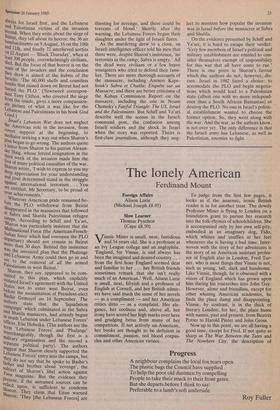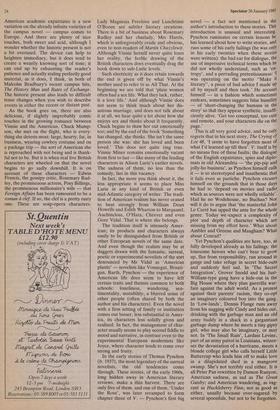The lonely American
Ferdinand Mount
Foreign Affairs Alison Lurie (Michael Joseph £8.95) Slow Learner Thomas Pynchon (Cape £8.50)
Vlinnie Miner is small, neat, fastidious V and 54 years old. She is a professor at an Ivy League college and an anglophile. 'England, for Vinnie, is and always has been the imagined and desired country . . . from the first hour England seemed dear and familiar to her . . . her British friends sometimes remark that she isn't really much of an American.' Well, Alison Lurie is small, neat, fiftyish and a professor of English at Cornell, and her British admir- ers have said much the same of her novels — as a compliment — and her American critics ditto — as a complaint. Her ele- gance, her coolness and, above all, her irony have scored her high marks over here and grudging betas from many of her compatriots. If not actively un-American, her books are thought to be deficient in commitment, passion, red blood corpus- cles and other American virtues.
To judge from the first few pages, it looks as if the anaemic, ironic British reader is in for another treat. The dowdy Professor Miner is flying to London on a foundation grant to pursue her research into the folk-rhymes of schoolchildren. She is accompanied only by her own self-pity, embodied in an imaginary dog, Fido, which whines and snuffles at her feet whenever she is having a bad time. Inter- woven with the story of her adventures is the story of an American assistant profes- sor of English also in London, Fred Tur- ner, who is most things that Vinnie is not, such as young, tall, dark and handsome. Like Vinnie, though, he is obsessed with a vision of England which has grown upon him during his researches into John Gay. However, alone and friendless, except for other whining American academics, he finds the place damp and disappointing. Vinnie, by contrast, is in the thick of literary London; for her, the place hums with names, past and present, from Beatrix Potter to Harold Pinter and John Gross.
Now up to this point, we are all having a good time, except for Fred. If not quite as sharp as The War Between the Tates and The Nowhere City, the description of American academic expatriates is a new variation on the already infinite varieties of the campus novel — campus comes to Europe. And there are plenty of nice touches, both sweet and acid, although I wonder whether the historic present is not a bit overused. The device can help to heighten immediacy, but it does tend to create a wearily knowing sort of tone; it can end up by exhausting the reader's patience and actually staling perfectly good material, as it does, I think, in both of Malcolm Bradbury's recent campus hits, The History Man and Rates of Exchange. The historic present also leads to difficult tense changes when you wish to describe events in either the recent or distant past.
As the book goes on, there are also delicious, if slightly improbably comic touches in the growing romance between Vinnie and the American, Chuck Mump- son, she met on the flight, who is every- thing she detests most: large, hearty, fat, in business, wearing cowboy costume and on a package trip — the sort of American she is reproached with not being and is thank- ful not to be. But it is when real live British characters are wheeled on that the novel begins to go sadly downhill. It is on account of these characters — Edwin Francis, the gossipy critic, Rosemary Rad- ley, the promiscuous actress, Posy Billings, the promiscuous millionaire's wife — that Foreign Affairs has been rumoured to be a roman a clef. If so, the clef is a pretty rusty one. These are soap-opera characters Lady Magnesia Freelove and Lunchtime O'Booze are subtler literary creations. There is a bit of business about Rosemary Radley and her charlady, Mrs Harris, which is unforgiveably crude and obvious, even to non-readers of Martin Chuzzlewit. Although Vinnie herself never quite loses her reality, the feeble drawing of the British characters does eventually drag the book down to sub-Lurie levels.
Such electricity as it does retain towards the end is given off by what Vinnie's mother used to refer to as All That. At the beginning we are told that 'plain women often had a sex life. What they lack, rather, is a love life.' And although Vinnie does not seem to think much about her dis- astrous marriage, and does not talk about it at all, we hear quite a lot about how she enjoys sex and thinks about it frequently.. Chuck begins to thaw her out emotionally too; and by the end of the book 'Something has changed, she thinks. She isn't the same person she was: she has loved and been loved.' This does not quite ring true. Vinnie Miner remains emotionally vacant from first to last — like many of the leading characters in Alison Lurie's earlier novels. The sadness of them, no less than the comedy, lies in this vacancy.
In fact, the more you think about it, the less appropriate it seems to place Miss Lurie in any kind of British or even mid-Atlantic category of writer. The tradi- tion of American realism has never ceased to beat strongly from William Dean Howells and Edith Wharton to Marquand, Auchincloss, O'Hara, Cheever and even Gore Vidal. That is where she belongs.
The tradition itself is intensely Amer- ican; its products and characters always easily to be distinguished from British or other European novels of the same date. And even though the realists may be at daggers drawn with the fantastic, surreal, poetic or experimental novelists of the sort denounced by Mr Vidal as 'American plastic' — novelists like Vonnegut, Brauti- gan, Barth, Pynchon — the experience of American life does seem to have left certain traits and themes common to both schools: loneliness, wandering, sen- timentality, mutability, a blurred sense of other people (often shared by both the author and his characters). Even the novel with a firm setting of family or institution comes out looser, less substantial in Amer- ica, its characters less solidly given and realised. In fact, the management of char- acter usually seems to play second fiddle to mood and narrative, in contrast even to the experimental European modernists like Joyce, where character tends to come over strong and fruity.
In the early stories of Thomas Pynchon (b. 1937), the most legendary of the surreal novelists, the old tendencies come through. These stories, of the early 1960s, long hidden away in American literary reviews, make a thin harvest. There are only five of them. and one of them, 'Under the Rose', was later revamped to form chapter three of V. — Pynchon's first big
novel — a fact not mentioned in the author's introduction to these stories. This introduction is unusual and interesting. Pynchon ruminates on certain lessons he has learned about how to write stories, and rues some of his early failings (he was only in his early twenties when these stories were written): the bad ear for dialogue, the use of impressive technical terms which he did not wholly understand, such as 'en- tropy', and a pervading pretentiousness: q was operating on the motto "Make it literary", a piece of bad advice I made up all by myself and then took.' He accuses himself — in a fashion which sometimes endears, sometimes suggests false humility — of 'short-changing the humans in the story' so tha't they appear synthetic, insuffi- ciently alive. 'Get too conceptual, too cute and remote, and your characters die on the page.'
This is all very good advice, and he only regrets that in his next story, The Crying of Lot 48, 'I seem to have forgotten most of what I'd learned up till then'. V. itself is by no means free of these faults; the dialogue of the English expatriates, spies and diplo- mats in old Alexandria — 'the pip-pip and jolly-ho business', as Pynchon himself calls it — is so stereotyped and inauthentic that it fails even as pastiche. Pynchon excuses himself on the grounds that in those days he had to 'depend on movies and radio which as sources were not wholly reliable'. Had he no Wodehouse, no Buchan? Nor will it do to argue that 'the masterful John Le Cane has upped the ante for the whole genre. Today we 'expect a complexity of plot and depth of character which are missing from my effort here.' What about Ambler and Greene and Maugham? What about Conrad?
Yet Pynchon's qualities are here, too, as fully developed already as his failings: the lonesome heroes who can't bear to grow up, flee from responsibility, run around in gangs and take refuge in secret hide-outs and suddenly feel sad. In 'The Secret Integration', Grover Snodd and his Just- William-type gang have a hide-out in the Big House where they plan guerrilla war- fare against the adult world. As a protest against their parents' racism, they co-opt an imaginary coloured boy into the gang. In `Low-lands', Dennis Flange runs away from his nagging wife Cindy and hides out, drinking with the garbage man and an old army buddy in a shack in a gargantuan garbage dump where he meets a tiny gipsy girl, who may also be imaginary, or may not. In 'The Small Rain', Lardass Levine, part of an army patrol in Louisiana, witnes- ses the devastation of a hurricane, meets a blonde college girl who calls herself Little Buttercup who leads him off to make love in a dilapidated shed in a mangrove swamp. She's not terribly real either. It is all Peter Pan rewritten by Damon Runyon; American sadness, as sad as The Great Gatsby; and American wandering, as vag- rant as Huckleberry Finn; not as good as either, usually because over-sugared by several spoonfuls, but not to be forgotten.











































 Previous page
Previous page